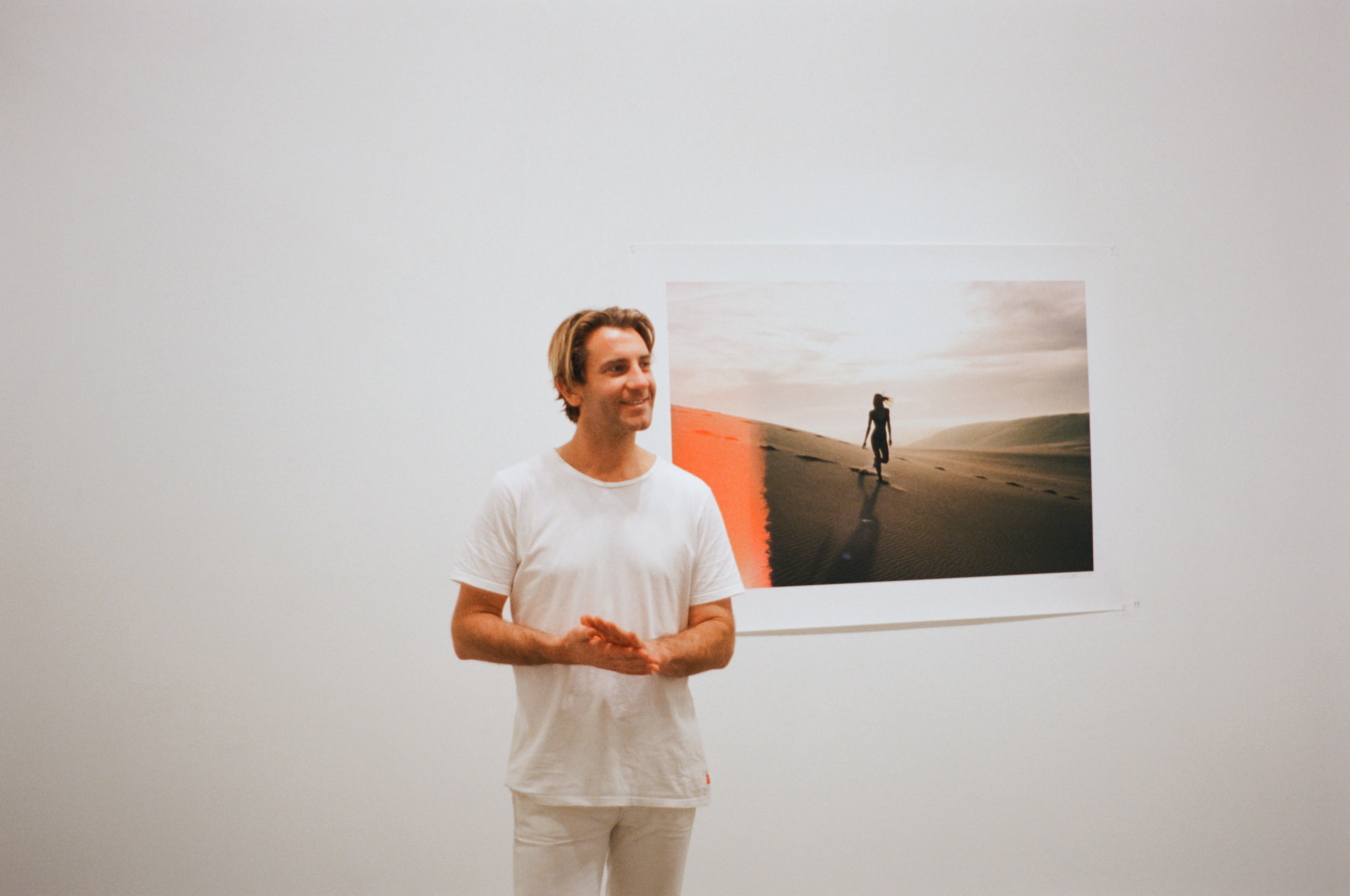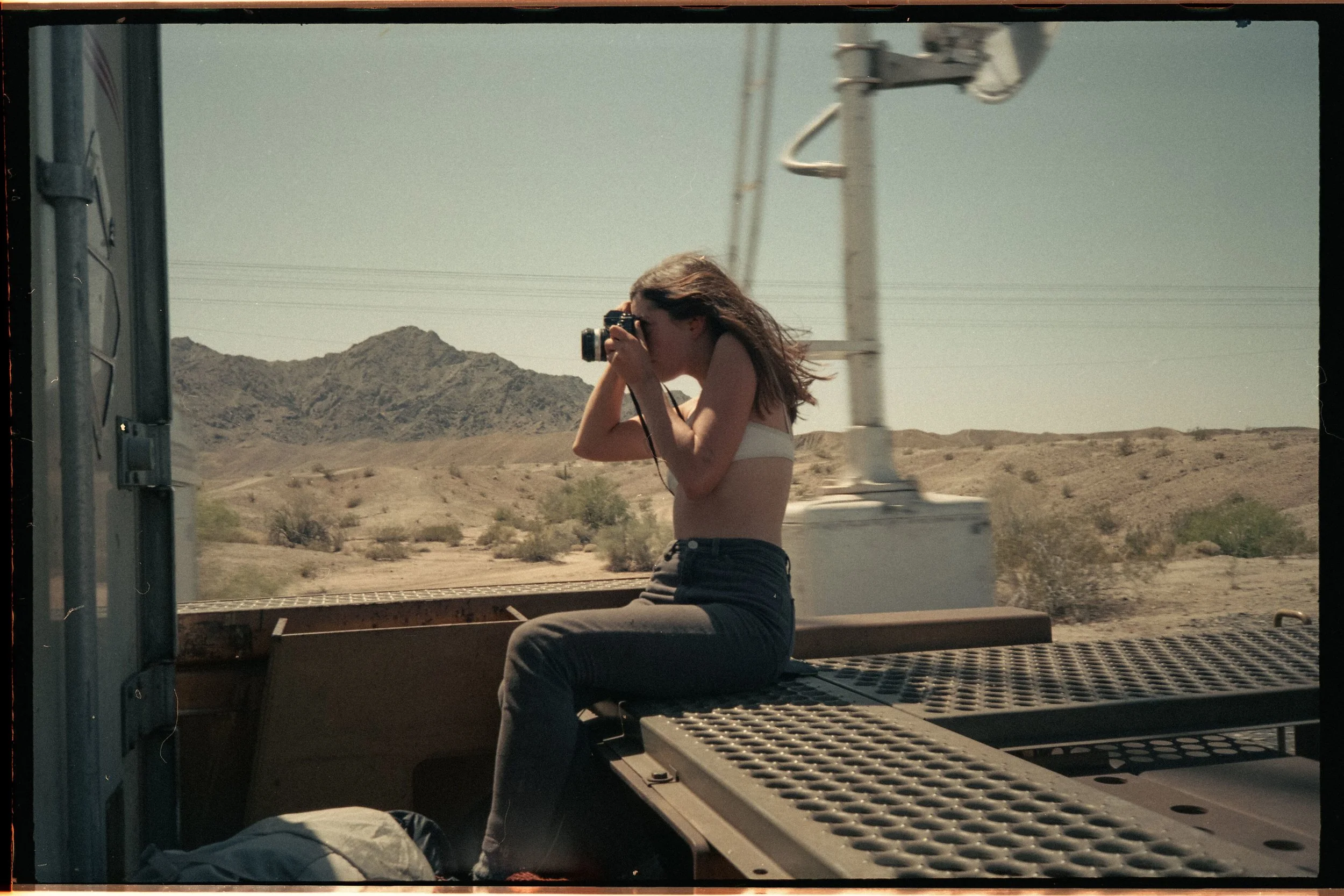A Conversation With … Tim Swallow
Following his immensely successful series ‘If We Die Tomorrow’, Tim Swallow has unsurprisingly delighted Sydney-siders at last weekend’s premiere of his new series ‘We Live Today’, at ‘Deutscher and Hackett’ in Paddington. This show has really solidified the notion of being a professional artist, and Swallow admits in this candid interview that he has come a long way from the shows predecessor. This time round, Swallow’s maturity as an artist with an eye for the magical really shines through in each piece. Swallow is renowned for his nostalgic, dreamy sense of escapism captured in both his commercial and personal, creative projects so it goes without saying that his reputation has not faltered him this year. Although notorious through popular campaigns for Thrills and Levi’s, Thea Elder sat down with him last week to pick his brain and discuss his relationship with photography, and how he lives a successful life through his personal passion.
BYO: How did you first get into photography?
Tim Swallow: I got into photography as a teenager. I just picked up a disposable camera and took a couple photos of my girlfriend at the beach, and she told me I took a really long time and to hurry up and I guess that’s when I first realised I was wanting to take a good photo not a shit… not just a whatever photo. And even that photo…it’s a really nice, candid photo. So I guess even back then something had tweaked in my mind - - I wanted to take a GOOD photo. But it really wasn't until I’d finished my course at uni, Building, Design and Architectural Drafting, that I travelled to Europe and I couldn’t leave the house without taking my camera everyday. That was really what taught me photography. All I photographed, really, was the architecture. I was just obsessed with it. Everyday I just took my camera and photographed all the architecture. Travelled through Europe for four years and through that started to slowly photograph, y’know, the odd character that might have been fixing his fishing lines or a little man playing the banjo or whatever it was, I just started moving more into portraiture. It wasn’t really until I got back (to Australia) that I was feeling quite confident photographing people so I started moving into that.
BYO: How did you make the jump from just photographing characters that you would see overseas to photographing, I’m assuming your friends, naked at the beach? Like, how did you transition into that? Because it’s quite hard getting someone to take their clothes off sometimes.
Tim Swallow: I guess what happened when I moved back from Europe…the first way I knew I could make money out of it (photography) was by ringing up all my old contacts in building and architecture and shooting commercially as an architectural photographer. And then photographing the builder and the architect and the owners of the house. From that I started shooting more people and fashion and then from fashion it became a little more like… seeing body, shape, and form as more of an art than seeing someone nude in a photograph and thinking, ‘oh, that’s porn’. So, all of a sudden it starts to turn into almost…sculpture. For thousands of years people have been sculpturing the human body and displaying it and that’s kind of what I wanted to do with this show (‘We Live Now’). It’s all about human shape and form rather than just ‘that guy get’s people’s clothes off’. It’s almost just sculpture if you look at each piece. It was a long process to get to this point.
BYO: Tell us about how The Lagoon Collective was born between you and Ed Triglone.
Tim Swallow: I’d been photographing for about 8 years full time, and a big part of what my clients started requesting was that we had video on every shoot. And I had met Ed Triglone (videographer) through a mutual friend, and I asked him if he wanted to photograph something with me and do all the video…when the first clip came out, it actually went live on ‘Desillusion' magazine and got quite a lot of views. So from the very first time we worked together we kinda knew we were on the same page. And then, over about the next 6 months, he more or less assisted me, for free, and every time I got budget I would pay him. So it was almost like an internship for him. And then it got to the point where a lot of other photographers started been interested in him working for them and I was kinda like ‘I’ve already invested 6 months into this guy I just, I would rather keep him’. And so he proposed to me… ‘let’s make a company’ and we’ll own it 50/50. We worked on that and we formed a company together and we worked almost only with each other for about four years. I find as a kind of package, when the aesthetic of the photo and video match each other it’s hard to really compete with someone who has worked almost purely with each other for four years. So, as a package it sells really well to the client, and that’s what they all want now, so it’s great.
BYO: Who or what inspires you when it comes to your series work (‘If We Die Tomorrow’ & ‘We Live Today’)
Tim Swallow: Hmmm. Well the first series was actually inspired by my nieces. They were probably about 2 and 4 at the time and I was sitting at my Mum’s house with my brother-in-law and his two little girls coming running out of the house laughing at each other because they were doing a ‘Nudie-Rudie’. Grandma came running out after them and they requested that she put the sprinklers on and they just ran around. And I sat there and y’know, Mum came out and we had a cuppa tea and my Mum had made all this delicious food and we just sat there. The girls just did their thing and the sun was setting and I was just thought to myself ‘this is actually so beautiful’. (I thought)…when is the point when that is really unacceptable? They’re having this really beautiful moment right now with uncle, father, and grandma, and that’s OK, but then all of sudden, maybe in 3 or 4 years it’s not OK to do that. Do you know what I mean?
BYO: I know what you mean.
Tim Swallow: So I was kinda like, that’s great, they’re just running around with no inhibition, completely free, not a worry in the world. I started thinking… how cool would it be to shoot something like that? So…then I did it.
BYO: (laughs)
Tim Swallow: So that’s really where it was inspired from. And then, after that, I felt like the last show (‘If We Die Tomorrow’) was a little…well…it was at the point where I was a bit immature and I think the show was a bit more immature. This one (‘We Live Today’) I put a lot more thought into exactly what place I was gonna shoot at, and what time…whereas the last one sometimes was literally just…we’re all pissed, lets go for a nudie swim at the beach or it really was just, let’s pull the car over and if someone runs down the road in the nude I’ll buy ‘em a 6-pack. Which is cool, coz that’s where I was at. But this one was actually quite thought out and I thought about the different colours, black and whites, and because it’s pretty much all shot on film…what film I was gonna shoot on and what time of day and location so…it’s a lot more refined.
BYO: Yeah I was like, looking through your work and kind of came to that conclusion as well, but yeah. It’s beautiful, I really like it.
Tim Swallow: Yeah the first zine compared to the second zine is completely different. They’re similar but they’re different.
BYO: So, you do commercial work as well as your own creative practice, how do you navigate between looking at something like business, and looking at something like it’s a personal creative work?
Tim Swallow: My commercial style is very similar to the way this (‘We Live Today’) is shot - - they just have clothes on, or I’m selling something. But I think what art directors and owners of agencies see is how far I can push people. I fucking push ‘em to the edge and if I can get a photo like this, there’s probably a really good chance I can photograph their skirt on a model in the backstreets of Paddington, because that’s not asking someone of much. Whereas this is really asking someone to do something completely out of their comfort zone. But in terms of the style…they’re very similar. Like for a lot of campaigns and brands I shoot stuff very, very similar.
BYO: What do you do when you’re not taking photos for work, or is this practice pretty engrained in your day-to-day now?
Tim Swallow: I’m actually a pretty strict person with myself because I find that as a freelancer it would be easy to sleep-in or go out or you know…as a freelancer you can make up your own schedule. I actually get up early every morning, or three mornings a week at least, at 5:30am and I go to yoga, and I come out of yoga and I go surfing and then I have breakfast and then I’ll go to work. Because my agency works in office hours and so does the advertising world, I pretty much have a 9-5. I don’t really shoot on the weekend anymore. I try not to really go out or drink or socialise pretty much Sunday through to Thursday. It’s very quiet, I just try to have a pretty boring week but that’s my time to get into a good rhythm and routine. And then on the weekend I like to go to art shows, and be inspired in that way, hang out with friends, and go surfing.
BYO: I know you’ve just wrapped up a show, but what's next for you? What do you have coming up?
Tim Swallow: Well today, we take down this show and then I go and have a look at the next location on Friday up in Byron which is, at this point… it may be the new Thrills warehouse. So they’ve got a big white space like this and that will probably just be a one night opening maybe …
Keep an eye out in the coming weeks via socials for Tim’s next show in Byron-Bay.







